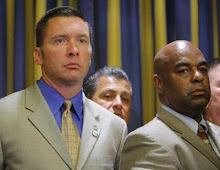

CHE
Variety
By TODD MCCARTHY
Over the years, Soderbergh has occasionally displayed a disregard for audience expectations in films such as “Full Frontal,” “Solaris” and “The Good German,” and presumably makes the “Ocean’s” films in order to earn the opportunity to undertake such projects. But “Che” is too big a roll of the dice to pass off as an experiment, as it’s got to meet high standards both commercially and artistically. The demanding running time also forces comparison to such rare works as “Lawrence of Arabia,” “Reds” and other biohistorical epics. Unfortunately, “Che” doesn’t feel epic -- just long.
For all its length, however, the mostly Spanish-language film provides a far from fulsome portrait of a complex man whose face still adorns T-shirts, campus dorm rooms and Mike Tyson’s body, but who is also scorned by many.
Part one begins intriguingly with a flurry of time-jumps showing Ernesto Guevara at different times and places: Meeting Fidel Castro for the first time in Mexico in 1955, in Havana and at the United Nations in 1964, onboard a ship in 1956 heading to Cuba with Castro and 80 other revolutionaries who formed the core of their movement, and suffering from asthma in the jungle the following year. Intro’s snippets of assorted information and events suggest an overall kaleidoscopic approach that, if pulled off, could conceivably provide a completed jigsaw puzzle by the end.
Card-shuffling technique employed by Soderbergh and scenarist Peter Buchman also lays in a lot of political background and dogma via interview and voiceover. A revolutionary, Guevara says early on, “goes where he’s needed,” which in the case of this well-educated, well-traveled Argentinean, means to foreign climes to hasten the spread of Marxism-Leninism.
It can’t necessarily be said that the film takes its protagonist’s point-of-view or reps an endorsement of his positions -- Soderbergh remains too far outside his subject for that -- but it does give such ample airing to communist ideological thinking -- and presents American and Latin American authorities so exclusively as cardboard mouthpieces of imperialism and abusive dictatorships, respectively -- that some conservative political commentators might work themselves into a lather over it. However, so few people will likely see the picture, at least in its current state, that there’s little chance it will have much cultural impact other than by the fact of its very existence.
In a patchwork manner, the film portrays with reasonable clarity the way in which a few dozen men fought their way across Cuba from east to west, gathering more recruits and winning the help of locals as they went in their determined effort to overthrow the corrupt, U.S. and Mafia-backed president, Gen. Fulgencio Batista. Lots of attention is paid to military strategy and procedure while Guevara, who enjoys Castro’s trust, is promoted to commandant, and, after being temporarily sidelined, begins to distinguish himself in battle and eventually leads his men into a key fight at Santa Clara, paving the way for the final push into Havana.
Oddly, “Che” seems more about denial of audience expectations and pleasure than it does about providing the intellectual and historical heft that would serve as a good alternative. Soderbergh withholds much in addition to dramatic modulation, narrative thrust and psychological insight: A feeling of revolutionary zeal, the literal transformation of Ernesto into Che, his marriages and family life, the depiction of the entry into Havana, Che’s oversight of many executions after victory, the Cuban missile crisis and Che's wish that nuclear missiles be immediately fired at the U.S., his mounting distaste for Russians, his obsessive diary writing, his “lost year” as a failed revolutionary sparkplug in Africa before heading for his fatal misadventure in Bolivia, and even the famous photograph.




















